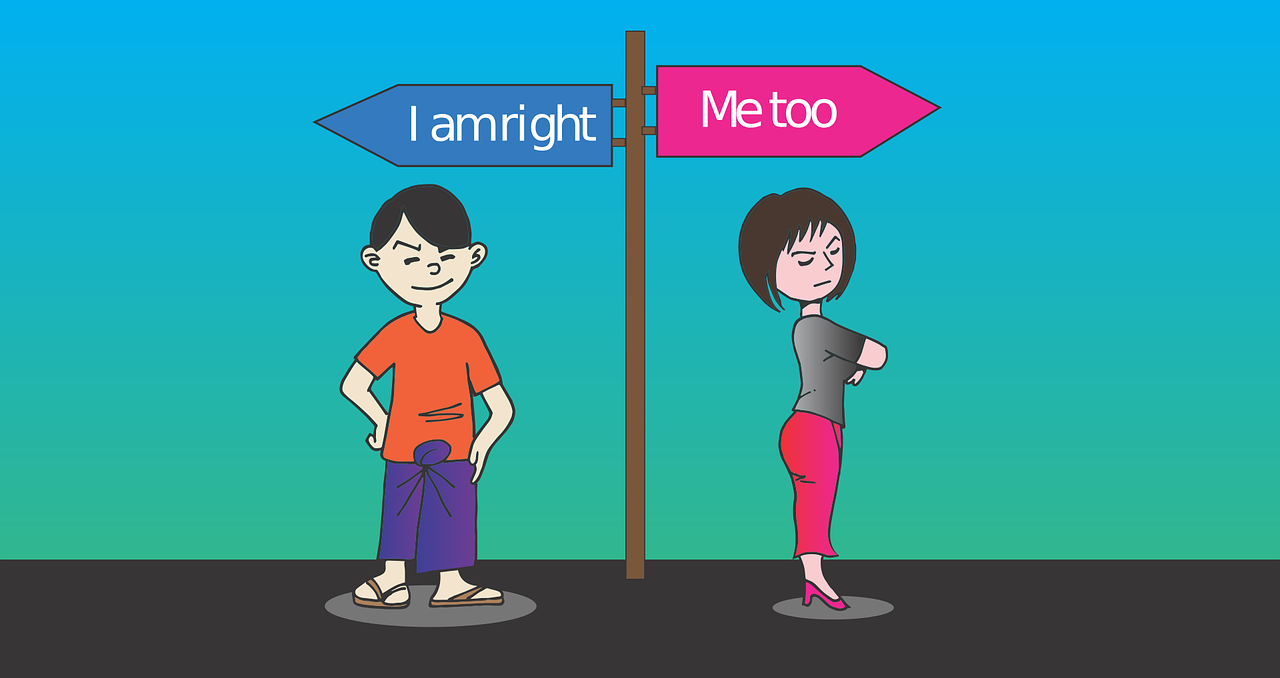
I read on social media today that sexism doesn’t exist in Islam.
That is true.
But it does exist in the Muslim community, just like in society at large.
We cannot continue to hide behind the perfection of God’s message while we ignore the imperfections we see and hear in our daily lives.
Recently, I wrote about accidentally sending a text picture of myself without my scarf to a male colleague. [Stuff Happens]. I then received an instant message from a Muslim man explaining that it was okay because it was not on purpose – but that I needed to remove a picture from my Facebook of my husband and I kissing.
He explained:
I’m a knowledge seeker and I never seen such a pic of any Muslim woman in hijab, so can you please explain to me how that is fine and is not a conflict with the concept of hijab?
Thanks
I replied it was acceptable because he is my husband.
He responded:
Yes and you can take a pic with him while your head is uncovered, because he is your husband. Then why its not fine to post a pic of you without scarves with your husband and is fine to kiss in public ?!!! In my humble understanding to Islam hijab for women is not on look it is on act i.e only your husband should see you in love acts and positions as he is the who can see your hair. BTW the same thing can be said to Muslim men since الحياء زينة المؤمن As prophet Muhammad GPBUH said and he didn’t determine the gender.
Again I’m really sorry to go that far with this conversation but there is no shy in religion and I consider you a sister of me in Islam.
I replied:
My husband and I see no problem with displaying public affection in moderation. Dry pecks and holding hands should be encouraged rather than discouraged. We celebrate love and others resonate with that feeling. Hijab does not make a woman an inanimate object or subhuman.
To which he responded:
I knew you’ll say that therefore I said that restriction in acts is on men and women ..
I see three problems displayed in this conversation:
First, why on earth is there an idea that women covering in modesty removes them from, not only the realities of life, but specifically from displays of affection? Namely the very concept of love. I totally get that ‘making out’ in public is something that no self-respecting person should do, but dry-kissing and holding hands between spouses? Really?
This is a discussion my husband and I had when we first got married, over 17 years ago. Culturally, though he could not put his finger on why he thought so, my husband did believe we should not have public shows of affection. I argued differently and even asked scholars. Since then, we always hold hands and peck in public – even in the Middle East. We’ve never had any problems.
Second, of all things I have written, on way more important topics, this man has never responded to any of them. The most important thing to him was that I had posted a picture dry-kissing my husband.
Third, and most important, he actually thought he had negated the sexist view by including ‘the same thing can be said of Muslim men.’
It didn’t.
His whole argument was based on my attire. As though I could have had the same picture as long as I was not a scarf-wearing woman. Really?
What a drag for scarf-wearing women that we have ‘different rules’ than everyone else.
While I agree that my chosen attire means I am a walking symbol of Islam – everything I do becomes ‘what Muslims do’ and ‘how Muslims act’ – but shouldn’t my representation be joy and love?
There is no reference in the Quran or Hadith (sayings and practices of the Prophet, peace be upon him) discouraging displays of affection toward your spouse. Are you seriously going to argue that these issues did not exist during the time of the Prophet (pbuh)?
If it’s not mentioned, it is halal (permissible).
Further, scholarly interpretations are ‘legal opinions’ and not religious law – and there are many that support both our views.
I embrace and encourage opposing views, especially in the area of religious interpretation. This was practiced by scholars all throughout history.
The more discussions we have, the more we understand each other and ourselves… and our religion.
But we have to have the discussions. And the analysis. We cannot sit back and say ‘we don’t know’ and let people who equally don’t know control the conversation just because they have a lot of self-confidence. You can find out. You can question. And you can and should make a decision based on that information.
Because you’re making a decision anyway aren’t you? You are either following the pack or doing what you want even if ‘it’s against the religion.’
Better to make an informed decision for yourself.
Many of our most formative rules about how to live come through others. And these rules are tightly bound to ideas of what is good and bad, right and wrong. – The Code of the Extraordinary Mind
None of us are ‘plastic bags being tossed in the wind’ and we need to stop acting like we are. God gave each of us a brain for a reason.
I would like to further point out that it is disingenuous to focus on sexism in the Muslim community as innately more egregious than society at large. Only a few days ago I heard a male television commentator tell an inspiring female guest at the end of an interview she should “stick to your thigh high boots.”
We’ve got a lot of work to do.